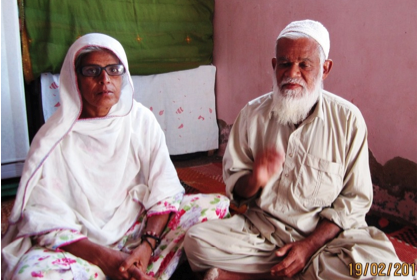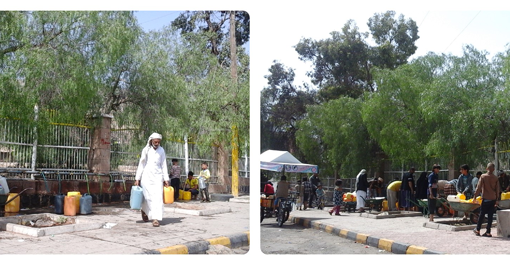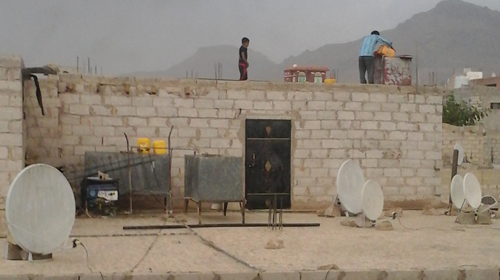By Madiha Al-Junaid (edited by Brett Scot)
July 9, 2015
As if it was not enough for Yemen to live through the turmoil of war, a new economic and environmental difficulty erupted to compound the country’s woes: Collecting firewood for cooking to survive.
Many of the poor people in the country who cannot afford the soaring gas prices shifted to cutting and collecting firewood. While their gas-heated ovens go unused, many people have resorted to using wood or clay ovens under such circumstances of cooking gas hikes.
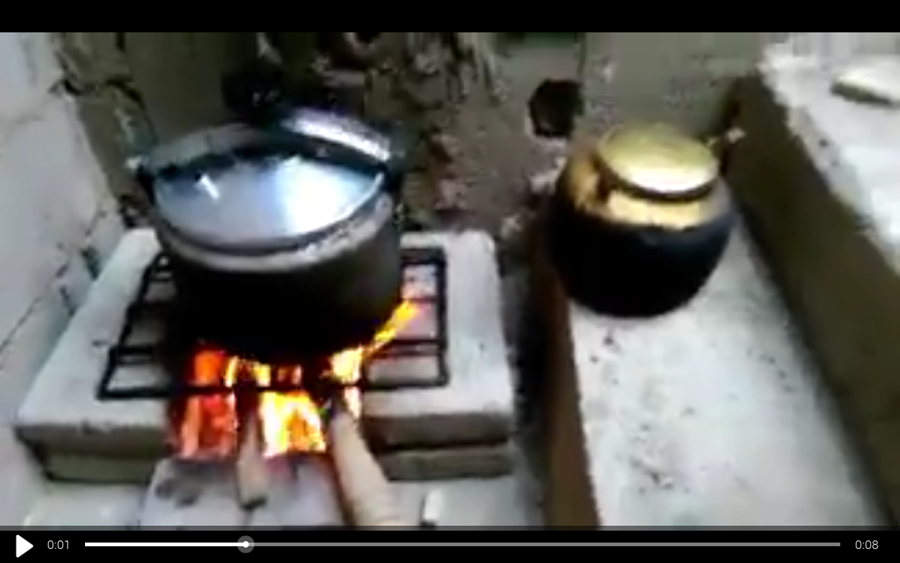
A video spread through social media, showing how some locals shifted to using firewood in cooking
The situation is aggravating in Yemen, and day by day the people of Yemen fear more the unavailability of cooking gas as Ramadan, Muslims’ fasting month, has arrived. For some city residents, even the alternative of using firewood is proving difficult in areas where it is sparse, unlike in villages and the countryside, where trees are plentiful.
In spite of such difficulties, in the early morning it has become very common to see women with firewood on their heads and people carrying dry, old tree branches, and sometimes even green, healthy branches.
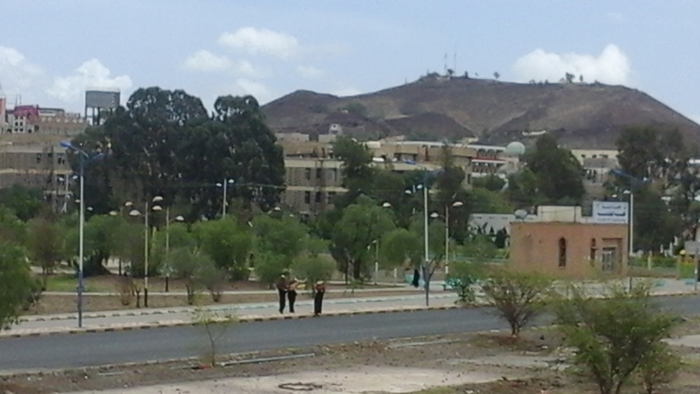
Women with firewood on their heads (Image: Madiha Al-Junaid)
People are frequenting certain areas so often to cut off branches – and sometimes entire trees – that some places within city limits have been robbed of their once-lush beauty.
When people first turned from cooking gas to firewood, patrols or nearby residents would often prevent them from using healthy, upright trees. However, as the fuel crisis increased in severity, it became acceptable in the public’s eye to use any trees, whether they were alive or not. While low levels of rainfall so far this season have reduced the already devastatingly low level of fresh water available, it does mean at least there is more dry wood available.
I myself struggled to accept the practice of cutting down healthy trees, or even healthy branches, especially in a city with little greenery to begin with. It angered me to see women cut the branches off of healthy trees in public parks then pick off the green leaves to try and fool people into believing they were dead branches found on the ground. As time passed, however, and I witnessed more and more suffering, especially among the poor who are unable to purchase gas, it became easier to accept. Hunger has mercy on no one!
In a photo circulated on Twitter, an old, slim man shown sleeping on the ground was said to have been waiting for more than four days for his turn to fill his gas cylinder. A seemingly endless line lay ahead of him. I am not sure whether he could even get the cooking gas, but I’ve heard a lot about other “dead ends,” when a person finally arrives at an empty – or declared to empty – station. What a psychological pain!

An old slim man sleeping on the ground was said to have been waiting for more than four days for his turn to fill his gas cilinder
Yemenis have been living through a severe fuel shortage, which has caused or worsened many other things, such as the shortage of water, the complete lack of electricity, and the low availability of Liquefied Petroleum Gas (LPG) used for essentials like cooking, heating, transportation, and operating electricity generators, among other things.
Nowadays, the domestic price of petroleum (propane gas used mainly for cooking) has increased by as much as 167 percent. The sudden jump from YR1,500 to YR4,000 ($7 to $18.60) in May reduced the long lines in front of automobile gas stations and greatly increased the number of people collecting firewood. Currently, some stations have started to sell cooking gas at YR4500 ($20.9) and even higher prices.
The fuel crisis began almost as soon as the airstrikes by the Saudi-led coalition and the blockade in Yemen began, and keeps getting worse. Furthermore, due to ongoing clashes between the Houthis and the resistance movement in several governorates and the lack of safety and security, many oil companies have shut their doors and suspended production until further notice. The civil war, specifically in Marib and Al-Jawf – two of the main governorates providing cooking gas and petrol – as well as Al-Qaeda’s continual bombings in Shabwa, another gas-producing governorate, have paralyzed the country’s fuel supply.
For the gas and petrol that has been produced, there are many factors that have negatively effected its distribution. These include tribal roadblocks in Marib; mismanagement in distributing the gas cylinders to different governorates; extortion by those selling it; a funding dearth due to the government’s lack of cash flow; and the way black-market traders amass gas cylinders to later sell at inflated prices – far beyond the reach of ordinary Yemenis, of whom more than 42 percent live below the poverty line of $2 a day.
The 1.9 million population of Sana’a city, the capital of a country dependent on dwindling oil production, is familiar with such distress. The lack of petrol (gas for driving) and LPG makes a big concern. However, the people fear more the inflation of fuel prices which can be stabilized at the new high prices at a later stage such as what happened a decade ago.
In 2005, reports revealed a large public failure to adapt to the YR200 to YR400 ($0.93 to $1.86) price jump in LPG. In less than ten years, the price has gone up again significantly.
Some people say the crisis was caused by the public’s fear that they would not be able to get a gas cylinder, and they therefore stood in line even if they had extra gas cylinders back home. As a result, a self-fulfilling prophecy occurred, and gas prices increased. It’s possible a similar fear could also lead people to stockpile firewood, and lay bare parts of the city where only a humble number of trees are found.
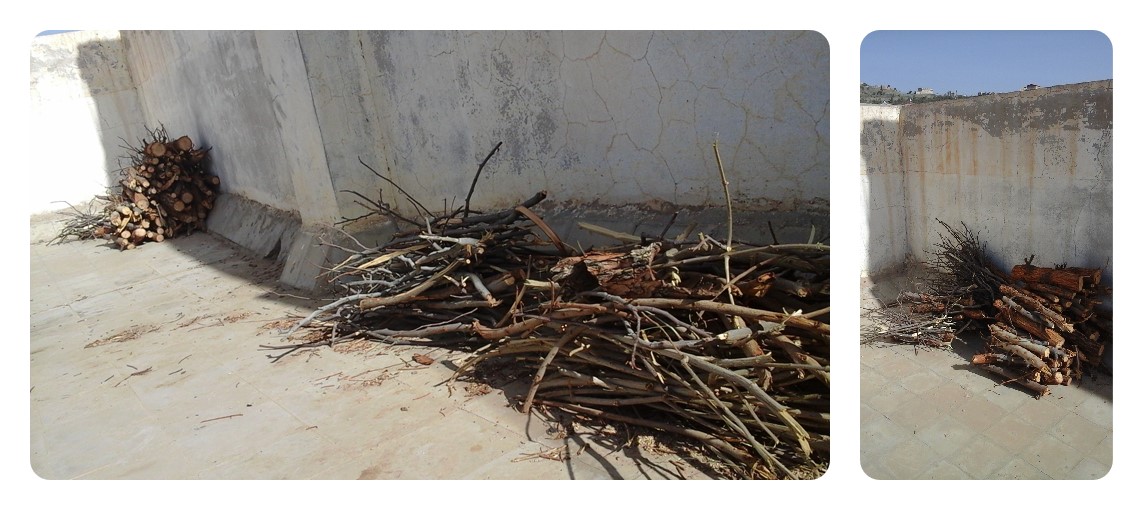 Packs of firewood (Images: Madiha Al-Junaid)
Packs of firewood (Images: Madiha Al-Junaid)
Selling firewood could also be a profitable business. Many of those who don’t have the means or time to wander around the streets and collect branches – or don’t want to expose themselves more to airstrikes and shrapnel or locals who prevent them from doing so – might prefer to buy firewood.
Some people have complained of firewood being sold at high prices, which sounds to me like the beginning of another black market, but not a monopolized one because trees can be found in many different parts of the city.
As a result, many people are also collecting papers and paper-boxes to use as an alternative to firewood, or with the firewood for the fire to grow bigger.
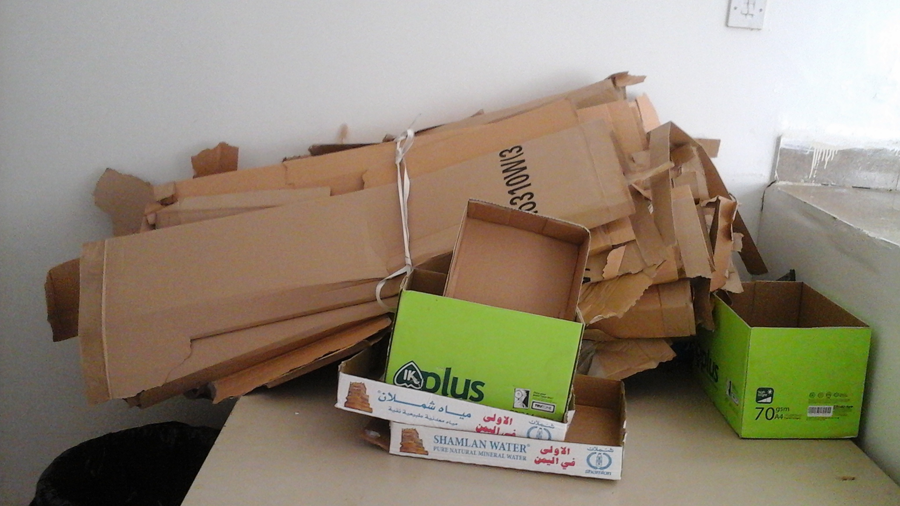
Firewood alternatives (Image: Madiha Al-Junaid)
The other day I saw a Hilux truck full of firewood. I had no clue where they got all those large and thick branches from, maybe from outside Sana’a, but I was so sure that they left that area ugly. I thought of two possibilities, one is that that vehicle carries all that firewood for an entire village or at least a large number of families, and two is that the vehicle is owned by a trader who will make a lot of money out of that firewood.

